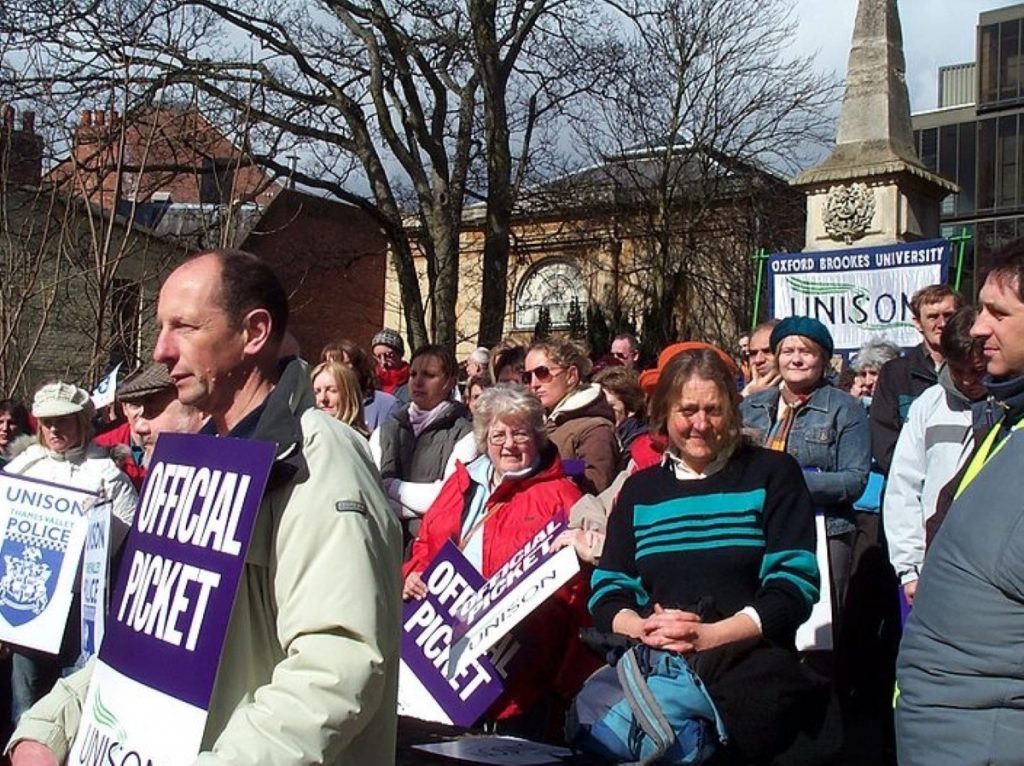The trade union bill sounds the death knell for workers’ rights
If the aim of the Tories' trade union bill is to kill off employment rights, it's likely to be successful. But for the thousands of workers on low pay and zero-hour contracts, there couldn't be a worse time for the government to deny them a voice in the workplace.
If the bill, which was debated in the Lords yesterday, is passed without amendments, a raft of regulations will be brought in to make it harder for workers to go out on strike. They include the introduction of a 50% turnout threshold on strike votes, a change to allow employers to bring in agency staff to cover work during industrial action, and a requirement for strike leaders to wear armbands on the picket line.
To pretend this bill is anything other than an ideological attempt to destroy trade unions is laughable. Despite the levels of government cuts and public sector job losses in recent years, the number of strikes remains relatively low. As Dave Ward, the general secretary of the Communications Union, said recently, the timing of the bill tells you everything you need to know. "It's not like the trade unions are running amok in the workplace out there, or that people in the world of work are having it all too easy," he told a meeting in Northampton, on Saturday. "This comes at probably the harshest time in recent memory in the world of work."
It's not just the usual suspects on the left who are concerned by the bill. Just yesterday the former head of the civil service wrote in the Guardian that the bill showed a "worryingly authoritarian streak" in the government. The Daily Mirror reported this week that the Equality and Human Rights Commission said Cameron's attack on trade unions may be illegal. And back in September, the Conservative MP David Davis said aspects of the bill were like something out of "Franco's Spain".



Conservatives use online voting to select candidates, but won't allow for trade union ballots
For many trade unionists, the government's refusal to allow them to use electronic voting shows that the talk of higher turnouts for strike ballots is just empty rhetoric. After all, the Tories are quite happy to use online voting for their own elections, as we saw when Zac Goldmsmith became the Conservative candidate for Mayor of London, ironically on a very low turnout. "We put forward a plan in relation to turnout and threshold," Lee Barron, the regional secretary for the TUC in the Midlands, told Politics.co.uk. "If their intention was really to increase turnout they should have listened to that."
The problem is not just about the regulations that will come into place, but also the message it sends to bosses. Since the government announced plans for the bill, a number of "lockouts", in which employers ban employees on strike from entering their workplace, have taken place. Over the last year or so hospital staff, firefighters and London Underground cleaners have all experienced this type of treatment.
This legislation tells bad employers that the government is on their side. Just look at the treatment of junior doctors in their dispute with the health secretary over new contracts. We've heard scare stories about hospitals not being able to cope if a Paris-style attack happened during the strike, and Jeremy Hunt has done his best to portray the strike leaders as politically motivated rather than actually caring about patient safety. "The shift of power is going to move overwhelmingly to the employer," Barron said. "Workers aren't holding this country to ransom or bringing the country to its knees without outlandish pay demands. These are often disputes about protecting terms and conditions."

John McDonnell has said Labour should back trade union action 'automatically'
While attending the same event as Ward and Barron on Saturday, the shadow chancellor, John McDonnell told the audience that he and Jeremy Corbyn would join junior doctors on the picket line today. Speaking to Politics.co.uk he also raised concerns over the bill. "It's irrational if their real objectives were about enhancing trade union democracy," he said. "It's not irrational if their real objectives are about trying to prevent trade unions from operating at all and I think that's what is on the agenda." He also warned that some workers may resort to breaking the law to allow them to fight for their rights. "They will just take action and you'll see wildcat action breaking out," he added. "It sours the industrial climate and that damages not just trade unions but employers and companies as well."
There is still some hope that the Lords will force some amendments to the bill, so that even if it's passed – which it surely will be – it can be watered down a bit. "There are a number of people who are not Labour party Lords but crossbenchers who are offended by it," McDonnell said. "Especially some of the law lords. The only example of legislation like this is under the Pinochet regime so I think there might be some crossbenchers who will join with Labour to oppose it."
Remove the ability to go on strike and you may as well ban trade unions altogether. The withdrawal of labour is the only bargaining chip workers have in disputes with employers. And who will stand up to protect the rights of workers if that happens? Not this government, that's for sure.









